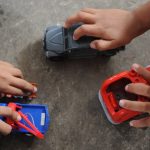It is estimated that more than 400 million children – one in six – are living in conflict zones. Despite this, crimes against children, including sexual violence crimes, are vastly underreported.
For over a decade, PHR has forged partnerships with health, police, legal, and justice sector professionals to focus on building best practices for forensic documentation of sexual violence and successful prosecution of and reparations for these cases. In doing so, we build multidisciplinary, survivor-centered networks that help break down barriers to justice for child survivors of sexual violence.
PHR improves children’s access to justice by:
- Fostering capacity development of individuals and institutions that support child survivors on their path to justice and reparation;
- Building multisectoral networks and partnerships to respond to systemic and conflict-related sexual violence against children;
- Researching the specific patterns of sexual violence that affect children in conflict-affected environments;
- Promoting evidence-based good practices in documenting and investigating sexual violence against children, for example promoting the use of a standardized forensic medico-legal certificate and providing training on evidence-based standards on how to interview children without causing retraumatization;
- Developing innovative survivor and witness protection tools that respond to the specific needs of protection and respect the agency of child survivors.
Our Impact: Justice for Children in Kavumu, DRC
In the Democratic Republic of the Congo (DRC), more than 40 young girls – some as young as 18 months – were taken from their homes and raped in the South Kivu village of Kavumu during a three-year reign of terror beginning in 2013.
In 2013, PHR’s Program on Sexual Violence in Conflict Zones began working with medical, law enforcement, and legal professionals to gather forensic evidence from the survivors in a bid to secure justice for the girls and their families. PHR worked side-by-side with clinicians documenting the girls’ injuries, helped to coordinate the investigation, and provided technical assistance to clinicians and police investigators. In June 2016 these efforts led to the arrest and trial of dozens of Congolese militia members in June 2016 including powerful regional legislator, Frederic Batumike.
For the first time the Congolese military court allowed witnesses and survivors to use voice modification technology to conceal their identities, ensured that survivors would not testify in public, permitted witnesses to wear head-to-toe coverings, and placed dividers between them and the defendants to protect their identities – all protections recommended by PHR.
On December 13, 2017, the court convicted Batumike and 10 others of crimes against humanity by rape and murder and sentenced them to life in prison – a watershed moment for justice in the Congo. Learn more about the Kavumu trial here.
Resources for Practitioners
Child-Centered Documentation Toolkit
Child-Centered Documentation Toolkit: Resources to Support Child Survivors of Conflict-Related Sexual Violence on their Pathways to Justice
PHR’s toolkit contains practical tools for professionals seeking to reduce the barriers child survivors face when seeking accountability and justice. This toolkit also seeks to improve the documentation and justice pathway for survivors by emphasizing trauma-informed and rights-based approaches, as well as supporting child autonomy and well-being. | English
ViVoMo Voice Modification System
ViVoMo is a voice modification system developed by PHR that empowers and protects victims and witnesses of sexual violence by allowing them to testify without being identified by the defendants, witnesses, or members of the public. | Factsheets: English French
Foundational Principles for Applying the Concepts of Consent, Assent, and Dissent
These foundational principles provide key considerations for professionals to use when developing and implementing consent and assent processes for child survivors of sexual violence that respect children’s right to be heard and evolving capacity within trauma-informed justice and reparation processes. These foundational principles were developed by Physicians for Human Rights (PHR) in collaboration with a community of practice made up of global experts from the medical, psychological, legal, ethical and human rights sectors. | Foundational Principles: English French
Child Interviewing Recording Kit
The Child Interviewing Recording Kit (CIRK) is a set of digital tools and technical protocols developed by Physicians for Human Rights (PHR) to guide medical, legal, and psychosocial professionals through the complex process of collecting video testimony from pediatric survivors of sexual violence and other abuses. | Factsheets: English French
Informed Consent: Videos
How to Obtain Meaningful Informed Consent
The Hymen: Fact Sheet

